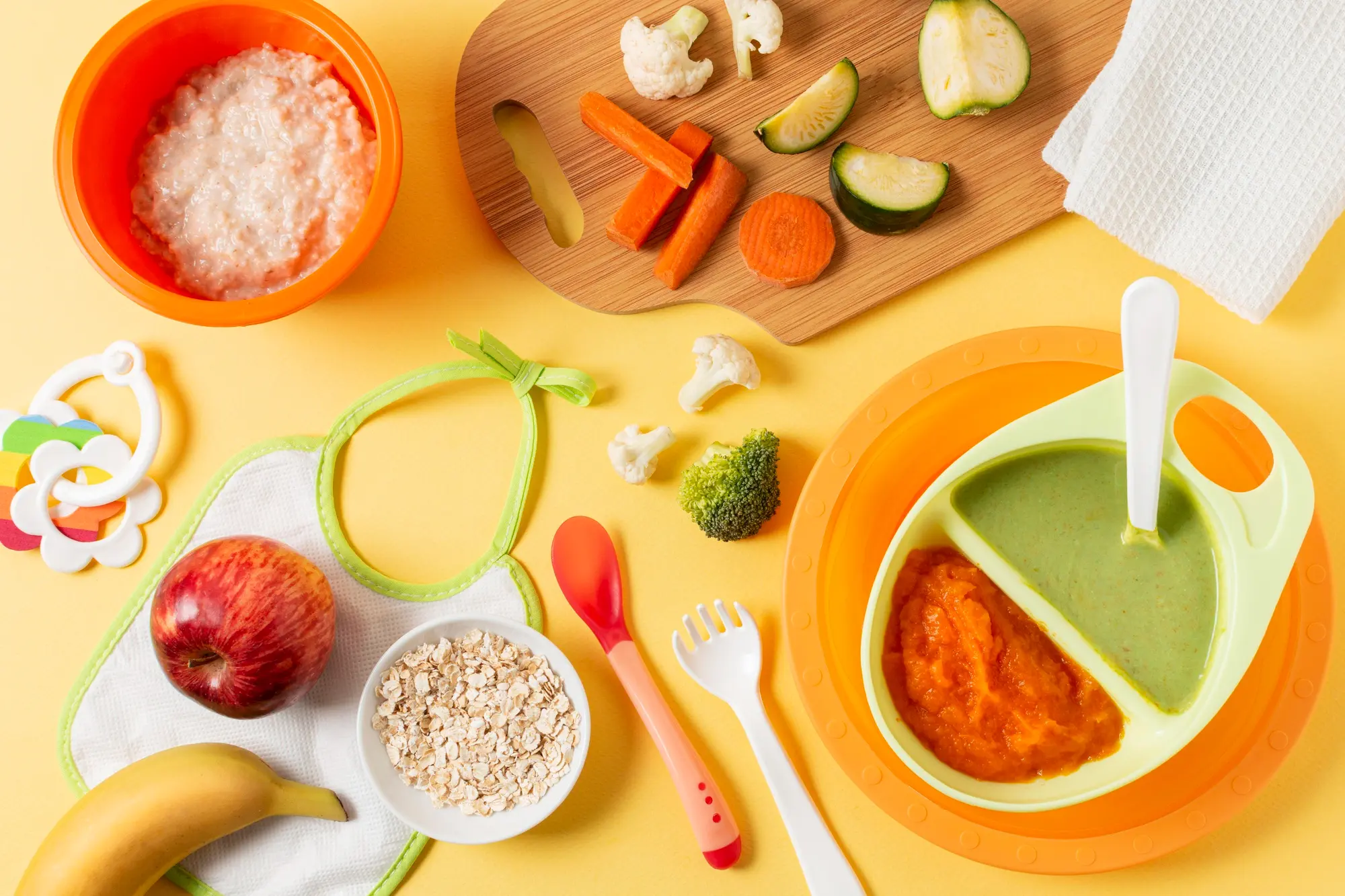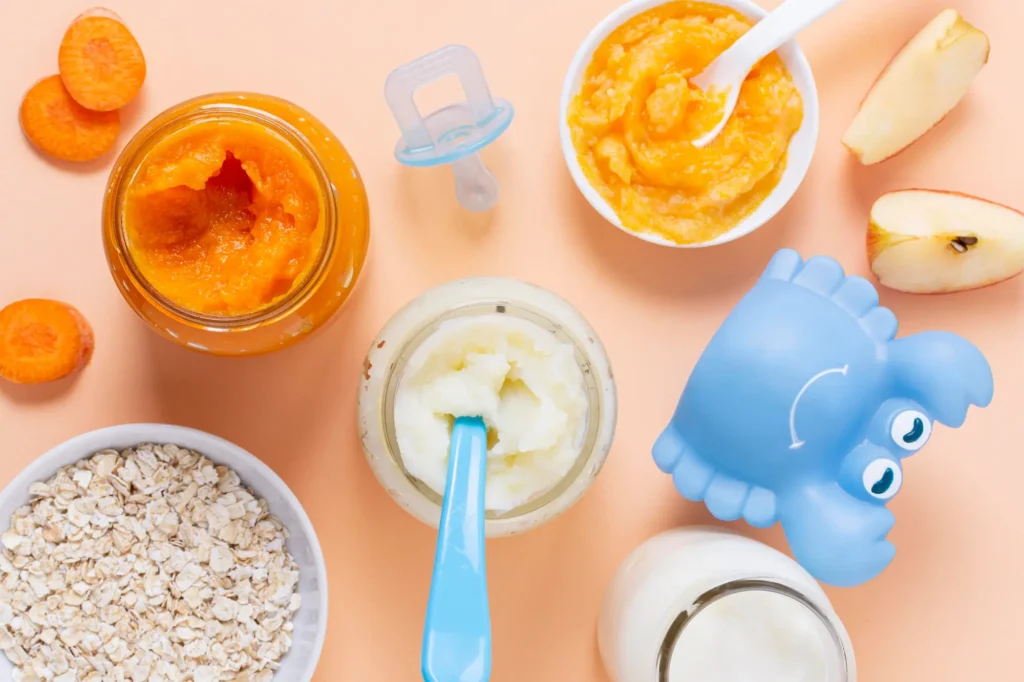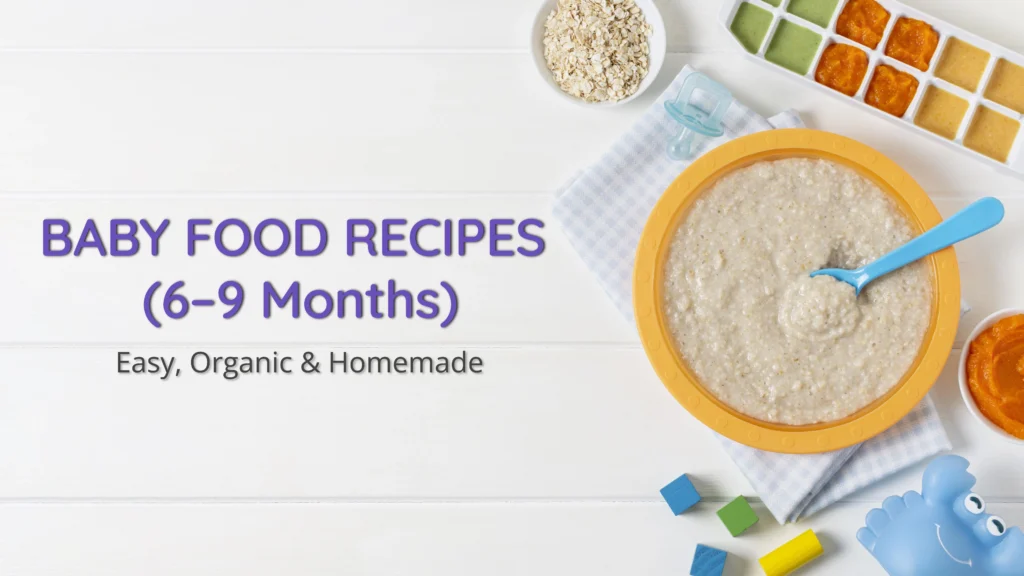Why Homemade Baby Food Is Worth Considering
There’s something calming about homemade baby food. You know exactly what’s in it. No scanning fine print. No wondering what “natural flavor” really means. You just steam, mash, or blend it yourself — and that’s that.
As a result, more parents are going back to basics with homemade baby food.
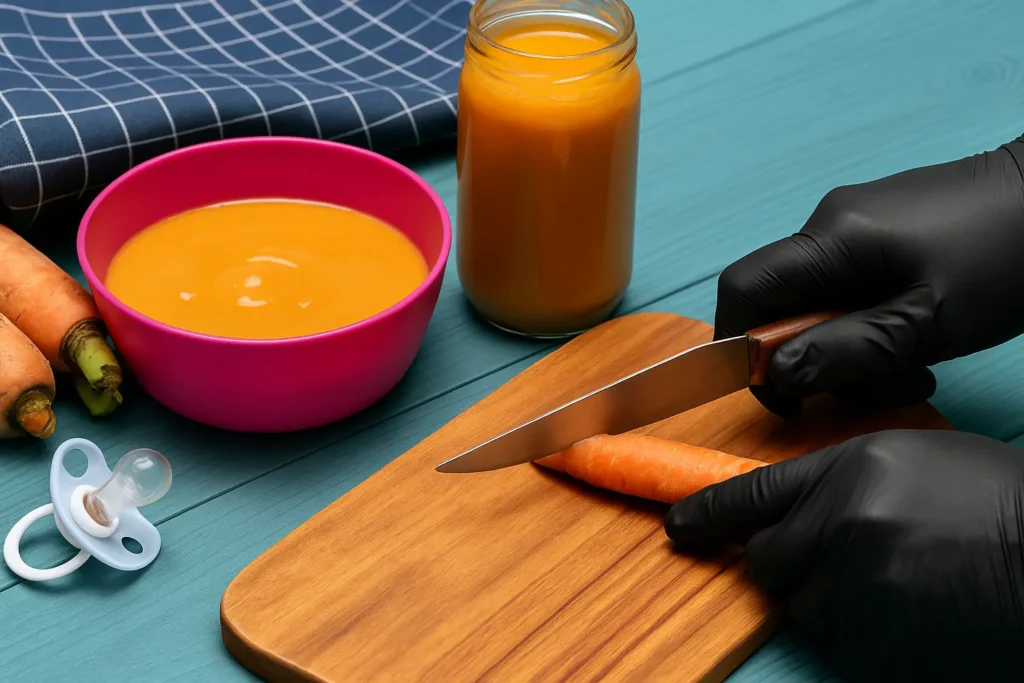
It’s not about chasing perfection — instead, it’s about trust. You pick the ingredients. Skip the weird additives entirely. And what you get? A little more peace of mind.
A 2021 investigation by Consumer Reports found concerning levels of heavy metals like arsenic and lead in some major commercial baby foods — even the organic ones.
It’s not meant to scare anyone, but it does make you stop and think. And for many parents, that’s the moment they decide to try making a few meals at home.
Let’s be real: most of us don’t start making baby food because we suddenly want to be gourmet chefs.
We start because something sparks a little doubt.
- Maybe you read a label and couldn’t pronounce half of it.
- Maybe your baby pushed away their store-bought peas, but happily grabbed a chunk of steamed carrot from your plate.
- Or maybe, like me, you just wanted to save money and stumbled into the health benefits along the way.
It’s not one big reason. It’s often a bunch of little nudges — and once you try homemade once or twice, it doesn’t feel as intimidating.
Key Benefits of Homemade Baby Food
1. No Strange Additives
The list of ingredients? It’s what you put in. That’s it.
No fillers, no stabilizers, and no “why is there sugar in a spinach puree?” moments. It’s clean, and babies seem to know the difference. You’ll see it on their face.
2. Full Ingredient Control
If your baby has allergies, sensitivities, or you’re just trying to introduce one food at a time, homemade gives you that control. Even things like texture and consistency can be adjusted based on your baby’s needs or developmental stage. Store-bought can’t do that.
3. It Actually Tastes Better
Let’s be honest — have you ever tried a jar of store-bought baby food? If so, you’ll know it’s… bland. Homemade has flavor. It smells like real food because it *is* real food. And when babies enjoy what they’re eating, they eat more of it.
4. It’s Cheaper Than You Think
This was the kicker for me. One organic pouch of sweet potato puree costs around $2. A single organic sweet potato from the grocery store? Maybe 80 cents — and you’ll get 5+ portions out of it.
Make a small batch, freeze in cubes, and you’ve got homemade meals for days. No fancy gear needed — just a blender and some containers.
Explore these Tips to Make Baby Food Prep Easier
Is Homemade Baby Food Actually Cheaper? Let’s Break It Down
Let’s run the numbers quickly:
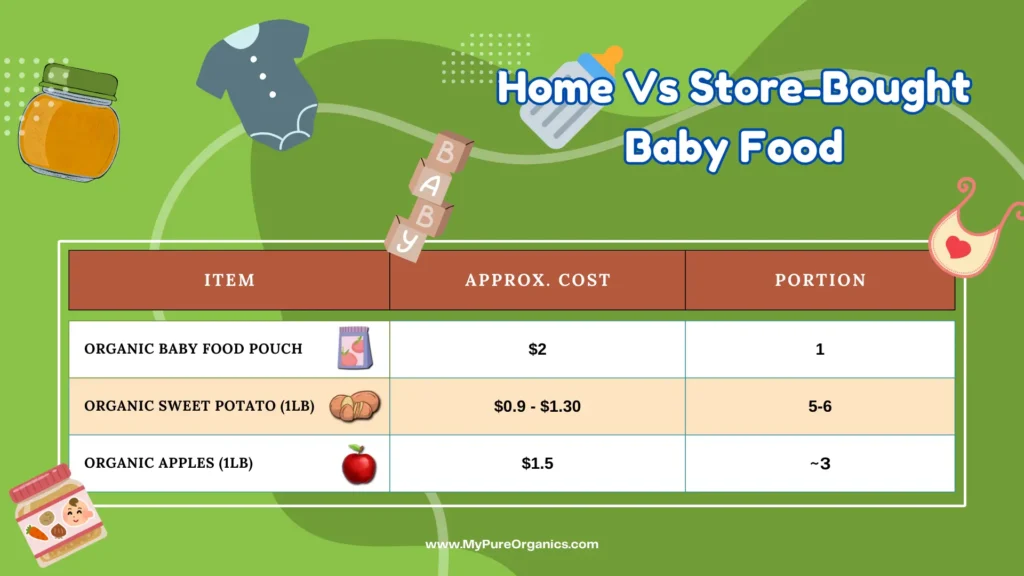
Even when you factor in storage containers or silicone trays, the cost per meal drops significantly with homemade. It’s not just healthier — it’s budget-friendly.
Homemade Baby Food vs Store-Bought: Nutrition Breakdown
What Store-Bought Gets Right
Let’s be clear — not all store-bought baby food is a problem. Surprisingly, some brands actually get a lot right. Companies like Once Upon a Farm and Yumi focus on organic ingredients, skip artificial preservatives, and go through rigorous safety checks. When you’re busy, having a trustworthy pouch on hand can be a real lifesaver — and that’s nothing to feel bad about.
Still, not all options are created equal. A comprehensive investigation by Healthy Babies Bright Futures found heavy metals in 95% of tested store-bought baby foods — including popular name brands. That’s why checking labels and knowing which brands test for contaminants really matters.
Why Homemade Still Wins in Most Cases
Let’s be real — when you make it fresh, it just hits different. A steamed carrot, a soft pear, mashed up minutes before feeding? That holds on to stuff like vitamin C way better than anything squeezed into a pouch last fall. This study breaks down how vitamin C fades in shelf-stored baby blends.
And commercial baby food? It’s cooked until nothing risky survives. Which is smart, sure. But that same heat takes a toll. Vitamins like B1, B6, and folate — gone, or nearly. You can’t see it, but your baby’s body knows. This paper explains how B-vitamins don’t hold up well in factory heat.
Now… the packaging. Let’s talk about that. Some jars or containers still carry BPA, or similar stuff. Even “BPA-free” doesn’t always mean safer — it just means different. Homemade food? You skip the whole issue. No guessing, no wondering. Here’s a real study on how BPA leaches into baby food.
This isn’t just about nutrition charts. It’s about control. Knowing exactly what’s in that spoon — and what’s not.
Is Homemade Baby Food Safe? What I Learned the Hard Way
One of the first things I googled when I started this journey?
“Can homemade baby food go bad?”
I was nervous. Like — is it okay if I keep it in the fridge longer than a day?
Do I need to sterilize everything like I’m prepping for open-heart surgery?
What if I mess something up?
Turns out, it’s not that deep. You don’t need a special baby food lab in your kitchen. Just clean hands, clean tools, and a little common sense.
Here’s what I learned by trial (and near-error):
- Let it cool before storing — always.
- Freeze in silicone trays (1 cube = 1 serving = less stress).
- Label the dates — trust me, your sleep-deprived future self will thank you.
- If I kept anything in the fridge, I used it within 48 hours. No guessing.
Not sure how long frozen baby food lasts, or how to thaw it safely? This frozen baby food guide breaks it all down — from storage to serving.
I’m not saying I didn’t worry at first. I did. But once you get into a rhythm, it’s just part of the flow — like folding onesies or prepping snacks. In the end, you’re already being intentional about what your baby eats. This? Just another step in that same direction.
3 Easy Homemade Baby Food Recipes to Get You Started
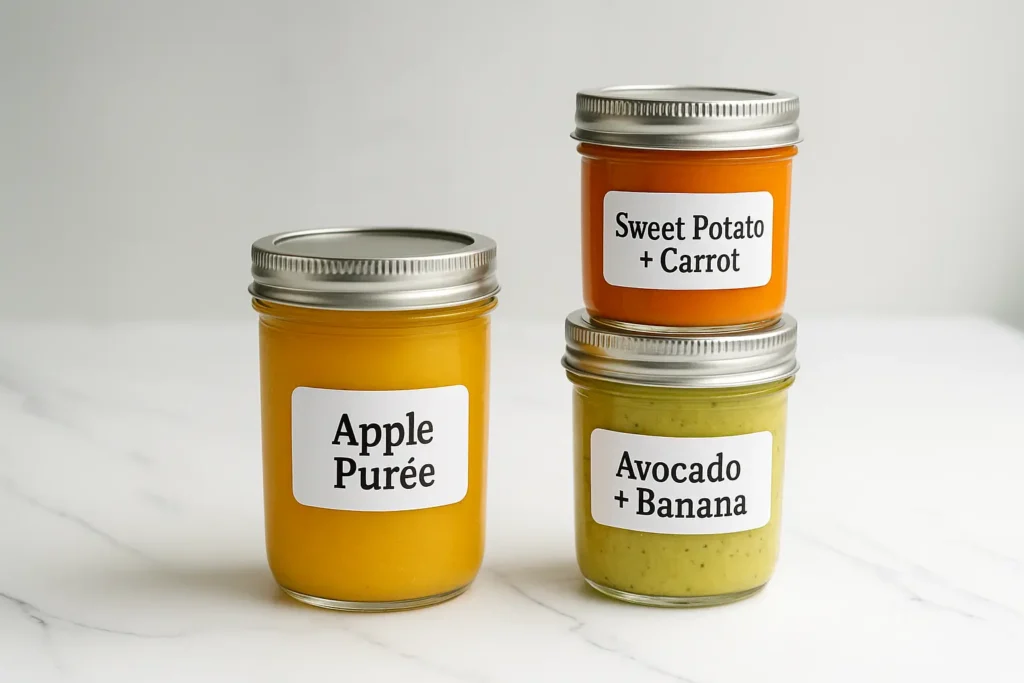
Want to keep it simple? Here are three beginner-friendly blends that take minutes — not hours — and taste like real food, not jar paste.
1. Apple Purée
Peel two apples. Chop ’em up. Steam for 8 to 10 minutes until fork-tender. Toss in a blender. Add a splash of breast milk, formula, or even a little water if it’s too thick. That’s it.
2. Avocado + Banana
Half an avocado. Half a banana. Scoop, mash, done. You can blend it if you want it smoother — but honestly, babies love a little texture too.
3. Sweet Potato + Carrot Mash
Steam one small sweet potato and two carrots until soft. Blend until smooth and mellow. Thin it out a bit if needed. The taste? Naturally sweet, no sugar needed.
👉 Need more starter-friendly blends like these? Here’s a whole batch to try.
How to Transition to Homemade Without Getting Overwhelmed
Start small. That’s the rule I wish someone told me earlier.
You don’t have to become a batch-cooking machine overnight. You can start with one food a week — maybe apples, carrots, or peas. Steam it. Blend it. Store it. Done.
I used to pick one veggie every Sunday, make a tray of purée, and freeze it in cubes. No special equipment. Just a blender, a spoon, and a little time.
By week four, I had a tiny freezer stash that saved me on busy days. And once you get into the rhythm? It honestly becomes kind of fun.
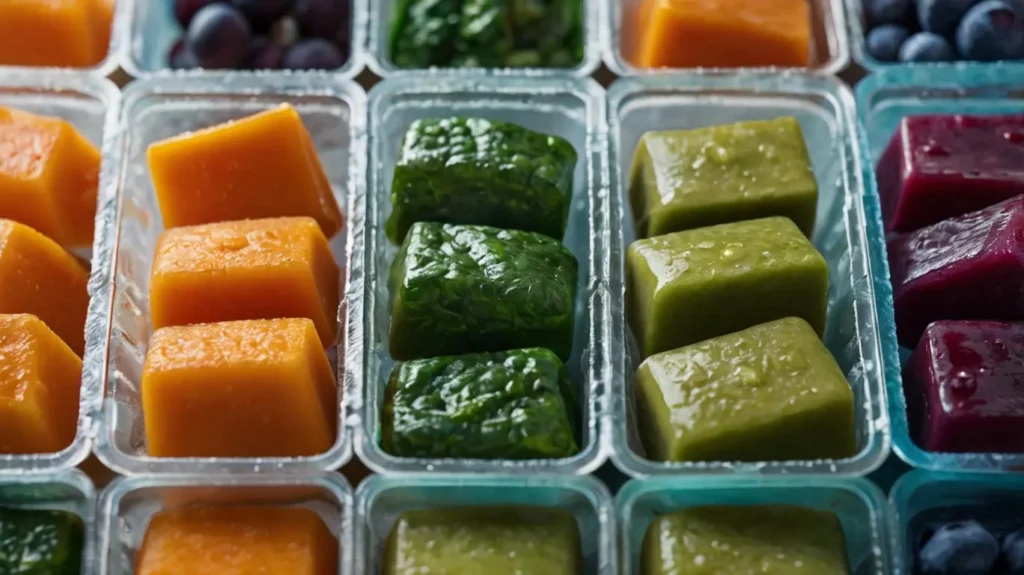
Above all, remember — every homemade cube is a step in the right direction. Not a requirement. Not a competition. Just a choice you get to make.
Real Parent Questions
Q: How long does homemade baby food last?
In the fridge: about 48 hours. In the freezer: 2–3 months.
Q: Do I have to make it fresh daily?
Not at all. Most parents who try that burn out fast. The better move? Batch it. One big cook session, then freeze portions so you’re not starting from scratch every single day. It’ll save your time — and your sanity.
Q: What if I don’t go all homemade?
Totally fine. No one’s grading you here. If you batch-cook a few meals and grab something organic from the store when life gets crazy? That’s still a win. What matters is what’s in the food, not whether you made it at 7am with a baby on your hip.
👉 This guide walks you through what to look for in organic baby food — and what to skip.
Final Thoughts: It’s Not All or Nothing
This isn’t about judging what other parents do. It’s about making food choices that feel right — for your baby, your budget, and your time.
If you make one batch a week and supplement with store-bought on busy days, that’s a win. If you start with just apples or carrots, that’s enough.
You don’t need to be perfect — just intentional. Homemade baby food gives you options, flexibility, and a whole lot more confidence in what’s going into that tiny tummy.

